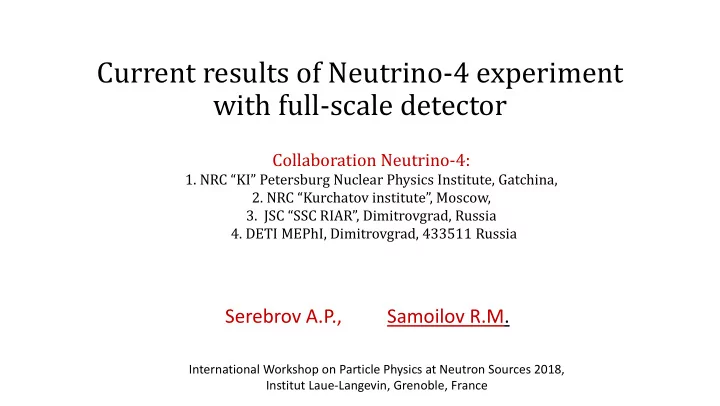

Current results of Neutrino-4 experiment with full-scale detector Collaboration Neutrino-4: 1. NRC “KI” Petersburg Nuclear Physics Institute, Gatchina, 2. NRC “Kurchatov institute”, Moscow, 3. JSC “SSC RIAR”, Dimitrovgrad, Russia 4. DETI MEPhI, Dimitrovgrad, 433511 Russia Serebrov A.P., Samoilov R.M. International Workshop on Particle Physics at Neutron Sources 2018, Institut Laue-Langevin, Grenoble, France
Reactor antineutrino anomaly • The reason of deficit could be � � oscillation 2 2 m [eV ]L[m] 2 2 14 P( ) 1 sin 2 sin (1.27 ) e e 14 E [MeV] C. Giunti INFN
SM-3 research reactor Vertical and horizontal • 100 MW thermal power sections of SM-3 reactor • Compact core 42x42x35cm • Highly enriched 235 U fuel • Separated rooms for experimental setup • Rooms poorly protected from space radiation
Reactor SM-3 Week protection from cosmic rays (3-5 m w. e.)
Neutrino laboratory at SM-3 reactor
Gamma background (NaI detector) 10 0MW reactor power 90MW reactor power L=6,28м Reactor power 90 MW 1 L=8,38м I , s -1 (200 keV) -1 0.1 L=10,48м 0.01 0.001 0 1000 2000 3000 4000 5000 6000 E, keV γ-background inside passive shielding depends neither reactor power nor distance to reactor
Fast neutron flux outside and inside passive shielding 120 100 Flux, (10 -5 s -1 cm -2 ) 80 Fast neutron flux 10 -3 s -1 cm -2 , cosmic background level 60 Fast neutron flux 9×10 -5 s -1 cm -2 40 20 outside (near reactor wall) inside 0 0 20 40 60 80 Reactor power, MW Neutron background inside passive shielding less by an order of magnitude than outside
Background First AS version suppress suppression background by an order of magnitude
Making full-scale detector • Cell structure (50 cells) • LAB-based Gd loaded (1g/l) LS • Hamamatsu R5912 (35) and PMT 9354 (15) only from above • Downside volume for active shielding
Full-scale detector installation 1. detector (5x10 cells) 2. internal active shielding (AS) 3. external AS (umbrella) 4. steel and lead 5. borated polyethylene 6. moveable platform 7. feed screw 8. step motor 9. shielding against fast neutrons from iron shot
Multi-section structure Multi-cells prompt signal condition completely suppresses fast neutron correlated events Average ratio 24 central and 16 side cells for full-scale detector multi/every for full-scale central cell side cell angular cell in all cells detector (0.37 ± 0.04) 0.42 0.29 0.19 0.37
Measurements with full-scale detector cell prototype
Measurements with detector Reactor ON and OFF spectra after 1 month exposition at 7.11m 181 � � � /10 � � (ON – OFF). S/B = 0.57 Unavoidable background of Li 9 and He 8 is 86 events/10 5 s
Distance dependence with Neutrino-4 detector and DANSS DANSS distance dependence provided by prof. M. V. Danilov Well agreement with 1/L 2 for now
Model independent analysis on DANSS and Neutrino-4 distance dependence • Method of oscillation parameters estimation by flux e distance dependence measurement is sensitive in 2 2 1 m eV range (without 14 comparison expected and observed absolute values) 2 2 • If distance 1 m eV 14 dependence deviation from 1/L 2 show itself evidently only at L < 5m and hard to be observed
Spectra at different distances with full-scale detector
Results of measurement with full-scale detector (spectral) In ratio observed/expected we use average (over all distances) spectrum and MC modeling result to improve statistical accuracy
Results of measurement with full-scale detector (spectral) • This analysis is model dependent and these results are very preliminary. Areas of possible parameters are caused mostly by deviation in 3 – 4 MeV range. • For model independent analysis we need better statistical accuracy which we can’t be achieved only by continuation of data collecting
• Collaboration with Future plans NEOS and DANSS • Baseline 6-14m • Two identical detectors • Cell structure • Expect better energy resolution • PSD capability due to NEOS scintillator and double ended readout 1. External AS 2. Internal AS 3. CH 2 B 4. Transverse sections 5. Longitudinal sections 6. PMT 7. Gamma-catcher 8. Scintillator 9. Moveable platform
Measurements with future detector cell prototype
• Collaboration with Future plans NEOS and DANSS • Baseline 6-14m • Two identical detectors • Cell structure • Expect better energy resolution • PSD capability due to NEOS scintillator and double ended readout Factor Relative error after 1 Method year of measurements with 2 detectors for each of 6 points Initial value -- 15% Gadolinium 4x acc. bg. suppression 11% concentration 0.5% 3d sectioning 3x acc. bg. suppression 8% Pulse form 5x corr. bg. suppression 6% Efficiency 2x count rate 3%
Summary • Neutrino-4 experiment for the first time measure reactor antineutrino flux distance dependence in range 6-12m • Full-scale detector measurements last results (spectra and flux distance dependence) are presented • There is a good agreement with 1/L 2 • It is possible to measure reactor antineutrino flux and spectrum at Earth surface in difficult background conditions, but improvements needed
Collaboration Neutrino-4: 1. NRC “KI” Petersburg Nuclear Physics Institute, Gatchina, 2. NRC “Kurchatov institute”, Moscow, 3. JSC “SSC RIAR”, Dimitrovgrad, Russia 4. DETI MEPhI, Dimitrovgrad, 433511 Russia A Serebrov 1 , V Ivochkin 1 , R Samoilov 1 , A Fomin 1 , A Polyushkin 1 , V Zinoviev 1 , P Neustroev 1 ,V Golovtsov 1 , A Chernyj 1 , O Zherebtsov 1 , V Martemyanov 2 , V Tarasenkov 2 , V Aleshin 2 , A Petelin 3 , A Izhutov 3 , A Тuzov 3 , S Sazontov 3 , D Ryazanov 4 , M Gromov 3 , V Afanasiev 3 , M Zaytsev 1, 4 , M Chaikovskii 1 Thank you.
Recommend
More recommend